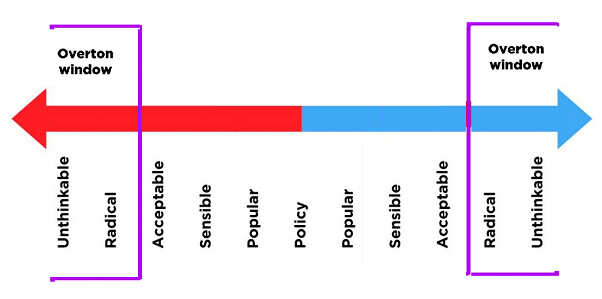Okay, Covington Scissoring the Overton Window?
Sunday, June 30th, 2019[ by Charles Cameron — different people have different insights, and if they’re any good, they may be worth bringing together to see how they intersect, overlap, intertwine, refute one another, or pass each other by unscathed ]
.
Two concepts from political science that deserve to be interlaced:
The Overton Window:
The Overton Window is a model for understanding how ideas in society change over time and influence politics. The core concept is that politicians are limited in what policy ideas they can support — they generally only pursue policies that are widely accepted throughout society as legitimate policy options. These policies lie inside the Overton Window. Other policy ideas exist, but politicians risk losing popular support if they champion these ideas. These policies lie outside the Overton Window.
But the Overton Window can both shift and expand, either increasing or shrinking the number of ideas politicians can support without unduly risking their electoral support. Sometimes politicians can move the Overton Window themselves by courageously endorsing a policy lying outside the window, but this is rare. More often, the window moves based on a much more complex and dynamic phenomenon, one that is not easily controlled from on high: the slow evolution of societal values and norms.
Source:
Mackinac Center, A brief explanation of the Overton Window
**
And The Covington Scissor:
In a short story published last October, “Sort by ntroversial,” Scott Alexander imagines a Silicon Valley company that accidentally comes up with an algorithm to generate what it calls a “Scissor.” The scissor is a statement, an idea or a scenario that’s somehow perfectly calibrated to tear people apart — not just by generating disagreement, but by generating total incredulity that somebody could possibly disagree with your interpretation of the controversy, followed by escalating fury and paranoia and polarization, until the debate seems like a completely existential, win-or-perish fight.
When you start arguing with someone over a Scissor statement, “at first you just think they’re an imbecile. Then they call you an imbecile, and you want to defend yourself. … You notice all the little ways they’re lying to you and themselves and their audience every time they open their mouth to defend their imbecilic opinion. Then you notice how all the lies are connected, that in order to keep getting the little things like the Scissor statement wrong, they have to drag in everything else. Eventually even that doesn’t work; they’ve just got to make everybody hate you so that nobody will even listen to your argument no matter how obviously true it is.”
Source:
Ross Douthat, The Covington Scissor
**
What happens when you Covington Scissor the Overton Window all the way open?
One half of the answer can be found in this title and sub-title by Amy Davidson Sorkin:
The Democratic Primary’s Moving Margins:
In the first debates, radical ideas were as much at the center of the action as at the fringes.
The other half is even more obvious, IMO — the Republican margin has been shifting to the further and far right, or at least that’s the view of political scientist Keith Poole of the University of Georgia:
The short version would be since the late 1970s starting with the 1976 election in the House the Republican caucus has steadily moved to the right ever since. It’s been a little more uneven in the Senate. The Senate caucuses have also moved to the right. Republicans are now furtherest to the right that they’ve been in 100 years
And the result, Overton-Window-wise?
Getting there..
Achtung!
.





